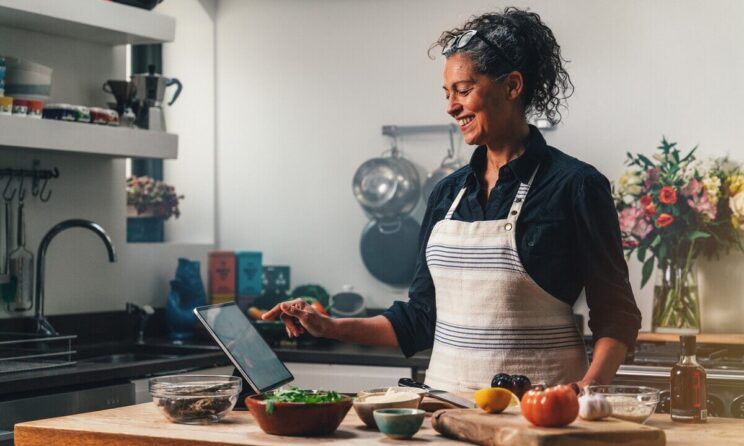
Cooking, once a mere necessity, has evolved into a delightful art form. Whether you’re a seasoned home chef or a novice eager to explore the kitchen, there’s always room for improvement. This comprehensive guide will delve into various aspects of cooking, providing practical tips and techniques to elevate your culinary skills.
Mastering the Basics
Before embarking on complex recipes, it’s crucial to master the fundamentals. Here are some essential skills to focus on:
- Knife Skills: A sharp knife is a chef’s best friend. Practice precise cuts like chopping, dicing, and mincing to enhance efficiency and presentation.
- Cooking Techniques: Familiarize yourself with techniques like sautéing, roasting, grilling, and baking. Each method imparts distinct flavors and textures to your dishes.
- Seasoning and Flavoring: Learn to balance flavors using salt, pepper, herbs, and spices. Experiment with different combinations to create unique taste profiles.
Expanding Your Culinary Horizons
To truly elevate your cooking skills, venture beyond familiar recipes and explore new cuisines. Consider the following:
- Global Cuisine: Immerse yourself in the rich tapestry of international flavors. Try your hand at Thai curries, Italian pasta dishes, or Mexican salsas.
- Cooking Classes: Enroll in cooking classes to learn from experienced chefs and gain hands-on experience.
- Online Resources: Utilize online platforms like YouTube and cooking websites for tutorials, recipes, and tips from culinary experts.
Essential Tips for Culinary Success
- Mise en Place: The French term for “everything in its place,” this organizational technique involves preparing all ingredients before cooking. It saves time and reduces stress.
- Taste as You Go: Don’t hesitate to taste your dish throughout the cooking process. Adjust seasonings and flavors as needed.
- Clean as You Cook: Keep your workspace tidy to maintain efficiency and prevent cross-contamination.
- Experiment with Flavors: Don’t be afraid to experiment with different ingredients and flavor combinations.
- Practice Regularly: The more you cook, the better you’ll become. Challenge yourself with new recipes and techniques.
Common Mistakes to Avoid
- Overcrowding the Pan: This can lead to uneven cooking and lower temperatures. Cook in batches if necessary.
- Neglecting Resting Time: Allow meat and poultry to rest before carving to retain juices.
- Overcooking: Pay close attention to cooking times to avoid dry, overcooked dishes.
- Ignoring the Importance of Resting: Let sauces and soups rest to allow flavors to meld and excess fat to rise to the surface.
Building a Well-Stocked Kitchen
A well-equipped kitchen is essential for culinary success. Here are some must-have items:
- Quality Knives: Invest in a good chef’s knife, paring knife, and serrated knife.
- Cutting Boards: Use separate cutting boards for meat, poultry, and vegetables to prevent cross-contamination.
- Pots and Pans: A variety of pots and pans in different sizes and materials will allow you to tackle a wide range of recipes.
- Utensils: Essential utensils include spatulas, spoons, whisks, tongs, and ladles.
- Baking Equipment: If you enjoy baking, invest in baking sheets, muffin tins, and various bowls and measuring tools.
Understand Timing and Patience
Timing is crucial in cooking. Overcooking, undercooking, or rushing processes can lead to disappointing results.
Example:
- Let steaks rest after cooking to allow juices to redistribute.
- Don’t rush yeast-based bread—it needs time to rise for the best texture.
Keep a Cooking Journal
Documenting your cooking experiments helps you track your progress, note successful dishes, and learn from less successful attempts.
What to Include:
- Recipes you’ve tried.
- Adjustments you made.
- Feedback from yourself and others.
- Experiment with New Ingredients and Recipes
Why It Matters:
Trying new ingredients and recipes broadens your culinary horizons and introduces you to different cooking techniques and flavor profiles.
Ideas to Try:
Cook one new recipe each week.
Incorporate international spices like sumac, harissa, or garam masala.
Explore alternative grains like quinoa, farro, or barley.
Understand the Science of Cooking
Cooking is as much a science as it is an art. Understanding the chemical reactions involved in cooking helps you troubleshoot problems and improve your skills.
Examples:
Browning: The Maillard reaction enhances flavor in grilled or seared foods.
Leavening Agents: Baking soda, baking powder, and yeast affect texture in baked goods.
Temperature Control: Knowing the right temperatures for frying, roasting, and baking ensures perfect results.
Books like On Food and Cooking by Harold McGee are excellent resources for diving into the science of food.
Cook Regularly and Embrace Mistakes
Practice Makes Perfect
Cooking is a skill that improves with repetition. The more you cook, the more confident and efficient you’ll become.
Learn from Mistakes
Mistakes are inevitable, but they’re also great learning opportunities. Burnt a dish? Ask yourself why and adjust next time. Over-salted? Learn how to counterbalance.
Engage Your Senses
Cooking is a sensory experience. Pay attention to:
Sight: The color of your food can indicate doneness or freshness.
Sound: Sizzling sounds indicate proper heat levels.
Smell: Aromas signal when food is caramelized or close to burning.
Touch: Testing texture ensures proper doneness (e.g., pasta al dente, steak firmness).
Cook with Others
Cooking with friends, family, or partners is both fun and educational. Sharing techniques and ideas enhances your skills and creates lasting memories.
Join a Community:
Attend potlucks or cooking clubs.
Share recipes with online cooking forums or social media groups.
Read Cookbooks and Food Blogs
Cookbooks and blogs are treasure troves of knowledge and inspiration.
Recommendations:
For Beginners: Salt, Fat, Acid, Heat by Samin Nosrat.
Cuisine-Specific: Essentials of Classic Italian Cooking by Marcella Hazan.
Baking Enthusiasts: The Bread Baker’s Apprentice by Peter Reinhart.
Improving your cooking skills is a journey that requires practice, curiosity, and a willingness to step outside your comfort zone. By mastering the basics, experimenting with new techniques, and staying patient, you can transform your culinary abilities and make cooking an enjoyable and rewarding part of your life.
Remember, every great chef started somewhere. So grab your apron, sharpen your knives, and start creating!

